The Perfect Combination of Knowledge and Service
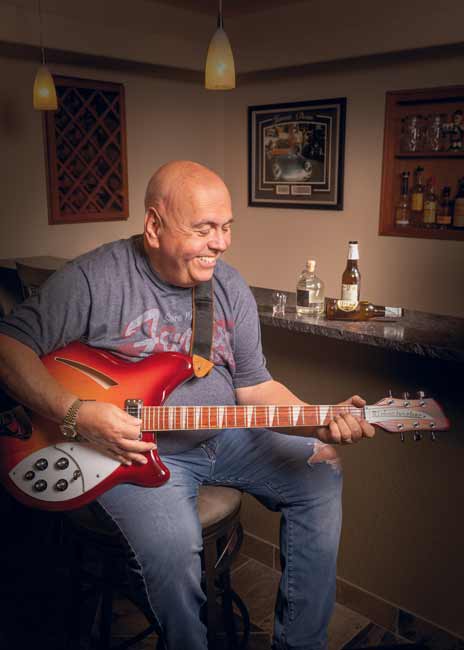 Bill Caruso has a deep love for music, stretching back to his time playing rhythm guitar for a traveling band in the 1960s and 1970s. He still plays occasionally at events and has played at The NAFEM Show. Photos by Paul BrokeringIn 1973, the year that William “Bill” Caruso got his first job in the consulting business, the Watergate hearings began, the Sears Tower in Chicago was completed and “Midnight Train to Georgia” by Gladys Knight and the Pips reached No. 1 on the charts. Today, Watergate is long past. The Sears Tower is now known as Willis Tower. And Gladys and the Pips have split up. But Caruso remains as active and vital in the consulting arena as ever. As the winner of the 2023 FE&S Hall of Fame Award, he combines a half century of consulting expertise with a legacy of community service.
Bill Caruso has a deep love for music, stretching back to his time playing rhythm guitar for a traveling band in the 1960s and 1970s. He still plays occasionally at events and has played at The NAFEM Show. Photos by Paul BrokeringIn 1973, the year that William “Bill” Caruso got his first job in the consulting business, the Watergate hearings began, the Sears Tower in Chicago was completed and “Midnight Train to Georgia” by Gladys Knight and the Pips reached No. 1 on the charts. Today, Watergate is long past. The Sears Tower is now known as Willis Tower. And Gladys and the Pips have split up. But Caruso remains as active and vital in the consulting arena as ever. As the winner of the 2023 FE&S Hall of Fame Award, he combines a half century of consulting expertise with a legacy of community service.
Learning the Basics
Caruso got an early start in the food industry, working in his family’s grocery business in 1960. Two uncles owned a high-end market in Summit, N.J., and they “wanted to introduce me to the business,” he says. “And I really wanted to work in the business. Our family was well known in the grocery business in our town, and my dad got into the restaurant business as well.” Even though Caruso’s involvement in the family grocery business was mainly limited to moving boxes and doing other odd jobs, that initial exposure to food and foodservice pointed him toward a career, and he enrolled in the hotel and restaurant program at the University of Denver in 1966. After a year and a half, he transferred to Cornell University’s School of Hotel Administration, from which he graduated in 1970.
As with so many of his generation, Caruso’s next stop was military service. Even in the service, however, he was involved with food as a member of the Army Quartermaster Corps, directing battalion dining at Fort Jackson, S.C. He returned to school after his Army stint and got a master’s degree in international business and business strategic planning from the University of Colorado Boulder in 1973.
After what he called “a long, tedious process of application and being vetted,” he landed his first industry job with the foodservice consulting firm of Harley Little Associates in Toronto. Following a series of acquisitions and relocations, he eventually wound up back in Denver in 1981. “It was very soon after that I left [Harley Little] and joined Thomas Ricca Associates as a principal. I then became an equity partner in a newly expanded firm that Tom started called Ricca, Colburn & Caruso,” he says.
By 1986, Caruso had been involved with many of the firm’s marketing and strategic planning efforts, and he made the decision to strike out on his own. “I felt that I had great opportunities,” he says. “The time was just right.” He launched the new firm, called William Caruso & Associates, from the basement of his home.
Over the years, William Caruso & Associates grew and, with affiliates and joint venture partners, expanded to 11 offices around the world. The firm was renamed WC & Partners in 2017. When Bill Caruso finally made the decision to retire and sell the company to Stephen Young and Bill’s son-in-law, Michael Caruso, in 2019, “we had completed over 9,000 iconic projects in 33 countries around the world,” Bill Caruso says. “So it was a pretty accomplished portfolio by the time I left.” Today, the firm he started, known as YoungCaruso, provides design and planning services to clients in a variety of industry segments.
Looking Back, Looking Forward
With five decades of experience in the industry, Bill Caruso has a unique perspective on where the business has come from and where it’s going. When asked to name the biggest change he’s seen in foodservice over the course of his career, he immediately cites technology. “The speed of technology is certainly the biggest factor that’s changed our business,” he says. “They had to take me kicking and screaming into the computer world years ago. Now the type of work we’re doing with building information modeling is high-tech stuff. And the ability for us as an industry to produce large-scale projects in the minimum amount of time is all born out of the technology developments that continue to be refined.”
Technological advances have had an impact on staffing over the years, Caruo adds. “Years ago, I would’ve had to have 100 staff members to complete a big stadium in three months’ time. Today, technology has increased our efficiency and effectiveness and enables even smaller to midsize firms to be able to do large, important jobs in a timely, efficient manner.”
Gazing into the future of foodservice operation and design, Caruso says the biggest trend he sees on the horizon is the ability to use automation to make up for labor shortages. “I don’t know if labor’s ever going to get back to the point at which it once was in terms of reliability and accessibility,” he says, adding that minimizing the need for large staffs will be crucial. Assistance will come through “automation, robotics, systems and approaches that can save on costly labor, if you can find and train labor. I see that going on infinitely and being refined in the future.”
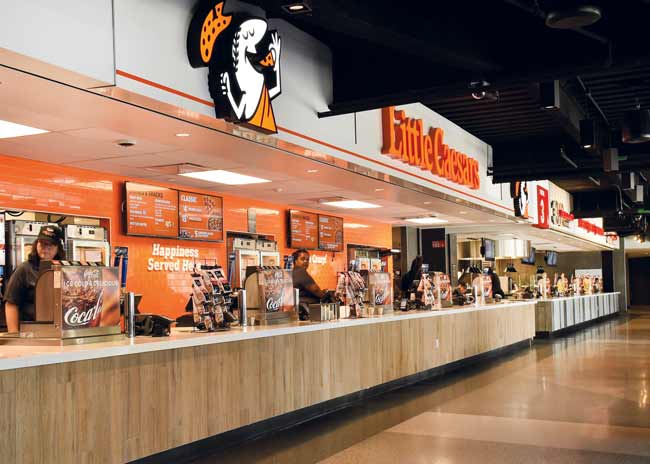 The concession area at Little Caesars Arena in Detroit, a project that Bill Caruso worked on.
The concession area at Little Caesars Arena in Detroit, a project that Bill Caruso worked on.
Steps to Success
Bill Caruso credits his success at least in part to his project management style, which he considers different from the way some other firms operate. “Many firms used to — and still do — have design studios where one person might do concept design, another person might do specs, another person might do construction documents. Another person would go out in the field and do the inspections, and another would do all the studies,” he says. He managed projects differently, reducing the number of people involved.
Caruso describes his management strategy as being “very singular in nature. Instead of six people, I narrowed it down to maybe two.” His reason for trimming down his project teams was simple. “The person who does the management advisory work thinks one way; the person who does the design thinks another. But they’ve got to meet up somewhere,” he says.
Caruso’s experience at other firms also influenced the type of people he assigned to projects. “I didn’t hire a lot of very junior people. I hired (and paid for) more experienced people who could take a project from the very beginning to the very end,” he says. Caruso felt this was beneficial for clients, who could get to know and rely on a single person throughout the project. “Having one project manager on the same job all the way through proved very successful for us,” he says. “And it was a little bit unique because a lot of [competitors] didn’t do that. They tended to specialize in various areas with different people, but I never did that.”
Caruso has always seen the role of a foodservice consultant somewhat differently than some of his industry peers. To him, the consultant is “the driver of the team, the hub of the wheel.” While the architect, the engineer and even the owner are part of the process, the consultant has to do the directing, he says. “The owners are a key part of it, but the owners are only signaling the consultant as to what they want, and they will say, ‘Give me some recommendations.’” Architects and engineers, he argues, know their specialties but don’t understand the special requirements of foodservice operations. “You have to guide them,” he says. “No matter how much they argue with us or say, ‘No, no, no,’ we have to say, ‘Yes, yes, yes … and here’s the reason why.’” Caruso recognizes that can often be difficult because of the egos involved, but “the owner is the client, and he or she’s the one who’s going to either benefit or get hurt by the decisions you make. You have to stand up for what you believe is right.”
Caruso also credits his strong ties with the manufacturer and dealer communities as being integral to his success. Believing that “you’re only as successful as the team you’re working with,” he realized early on that good working relationships with manufacturers, their reps and dealers were essential to executing projects successfully. “My name was on the drawings of these projects, and I needed the expertise of the factory, the dealerships and the reps,” he says. So Caruso spent time cultivating those relationships, particularly with manufacturers, so he could learn about new products and new trends. He communicated directly with senior leadership of the manufacturers to get the inside scoop on “new reps they were bringing on board or new dealers who were really great in terms of the quality and timeliness of their work,” he says. “I literally learned piece by piece from my friends in the manufacturing end of the business.”
Caruso has always taken a global view of his business, and that stretches back to his days as a graduate student at the University of Colorado Boulder. After taking two classes in international business, “I decided I wanted to really focus on it if I ever had the chance,” he says. Once he owned his own firm and was heavily involved in the Foodservice Consultants Society International (FCSI), he started making international contacts. “I met so many interesting peers through my FCSI work,” he says. “I talked to them about how they did business in various countries, what the norms and customs were,” he says. “Finally, I felt very comfortable asking a number of them if they would like to participate in a joint venture with my firm.” The contacts eventually led to many global working partnerships for the company, and Caruso credits it all to his graduate school curiosity and his FCSI contacts.
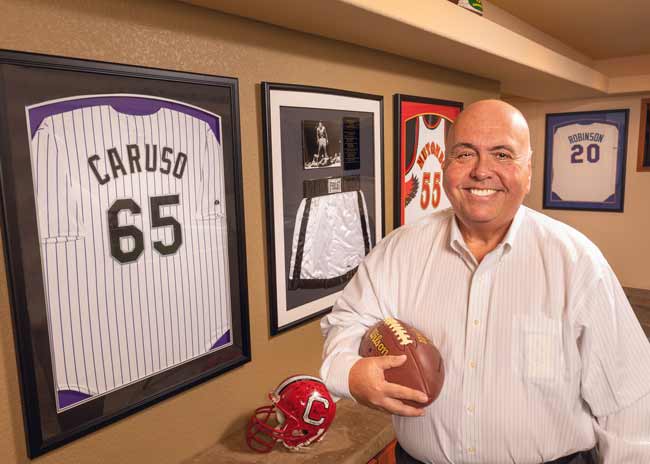 A lifelong sports fan, Bill Caruso displays some of the memorabilia he has collected over the years.
A lifelong sports fan, Bill Caruso displays some of the memorabilia he has collected over the years.
Keeping His Hand In
After 50 years in the business, Caruso was not going to just sit around and stare at the walls during retirement. “After three years, I was twiddling my thumbs,” he says. “I looked at my wife, and I said, ‘I’ve got to do something. I miss my colleagues and I miss the industry. I need to be creative.’” However, he faced the issue of finding something to do that would not compete with his former firm or with other friends in the industry. He came up with the unique idea of being a conduit between manufacturers and consultants, or as he puts it: “Why not connect my factory friends with my consultant friends?” He now specializes in connecting consultants with manufacturers trying to break into or expand into the U.S. with new products. “I’m the guy who is basically the ‘meeter-greeter.’ I’m not a technical rep or anything else — I just introduce friends to friends. I don’t have a lot of clients, but the ones I have keep me busy.”
Doing that has led to even more work, Caruso says. “I started getting calls from consulting firms, saying, ‘Bill, could you come in and spend a day or two and teach us how to improve certain aspects of our business?’ ‘How do you negotiate a contract?’ ‘What are important things to put in a proposal?’” Then he received calls from dealers, asking him about the best practices for working with consultants, so now he provides educational sessions for dealers as well.
In his post-retirement years, Caruso has become a business advisor to various foodservice communities. “From the years of being in the industry and the experience you get in knowing people, this new life sort of evolved. I do maybe 20 to 30 hours a month and it keeps me busy. It keeps my brain working, and it keeps me relevant,” he says.
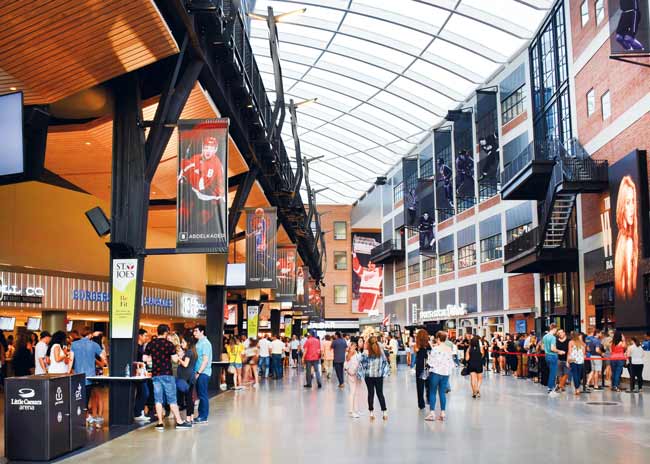 The concession area at Little Caesars Arena in Detroit, a project that Bill Caruso worked on.
The concession area at Little Caesars Arena in Detroit, a project that Bill Caruso worked on.
A Home Run Out of the Box
Of the 9,000-plus jobs that Bill Caruso’s firms worked on, one stands out to him. It’s a job that’s “really near and dear to my heart, because it started out everything for the firm,” he says. “In 1986, we were awarded our very first project for William Caruso & Associates. It was the expansion of Fenway Park in Boston for the Boston Red Sox. Anybody who knows baseball knows that Fenway Park is an iconic stadium.” For someone who played baseball in high school and college like Caruso did, there was a sentimental aspect to the project.
But beyond that, the Fenway Park job was another milestone for him. When he landed the project, “I was a one-man firm,” Caruso says. “I hired guys to come in and help me out, and that started it all. When I retired, we had completed 162 stadiums, arenas and convention centers all over the world.”
Helping Tomorrow’s Leaders
Caruso’s continuing involvement with the industry goes beyond working with those who are currently in it — it also extends to the next generation of industry professionals. For years, he has served as a mentor to college students who want to enter the business. “I’ve met a bunch of young people through my alumni associations, mainly from Cornell University,” he says. “And I was on the secondary schools committee interviewing students. After I left that committee, I started meeting unique, very talented individuals who, because of one thing or another, weren’t in a position to understand the potential they had.” So he began mentoring students in not just the foodservice business but in overall life skills as well. He gives them “encouragement, telling them what’s important to do, how to look at things from a life perspective and how success can be developed through making good decisions when they’re in high school and college,” he says. When possible, he guided them toward his alma mater, Cornell, where many of them eventually wound up.
The payoff to his efforts goes two ways, Caruso says, because after the students are out of college, they remain in contact with him. “They still stay in touch, and [some] get great positions and are very successful. That does my heart good. I continue to do that wherever the opportunity arises, where I see a student who’s in need.”
Caruso remains dedicated to Cornell to this day. He is a sitting member and past chair of the Cornell Hotel Society Foundation, a philanthropic organization. He was also named a lifetime member of the Cornell University Council in 2015.
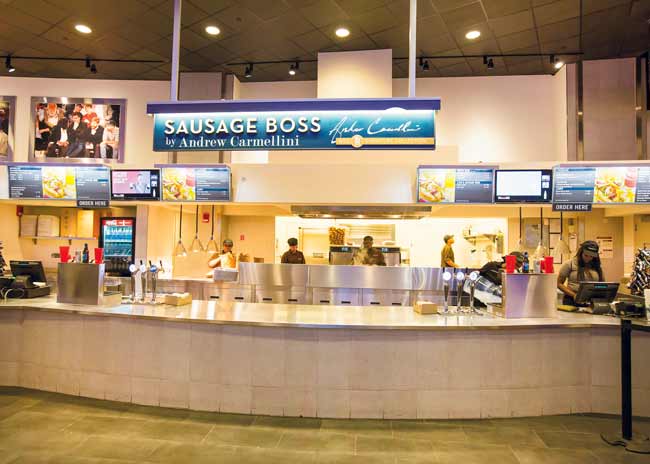 Another project that Caruso worked on is this specialty concession area at Madison Square Garden in New York City.
Another project that Caruso worked on is this specialty concession area at Madison Square Garden in New York City.
Friends First, Competitors Second
As a managing member and executive principal of YoungCaruso, Stephen Young has known Bill Caruso for nearly 40 years. He considers Caruso “an amazing leader and businessman whom I have admired personally and professionally. I know him as a great business partner with a fantastic insight into the guest and human experience in the world of food and beverage service.” Young describes Bill Caruso as “a champion for the industry,” particularly for his involvement in FCSI “to voice the importance of professional foodservice consultants in the design and management advisory world.” Besides the years of accumulated knowledge, Caruso has offered friendship as well. “Those who know him well have had an occasion or two to enjoy one of his amazing stories,” Young says. “I consider him a close business ally and an even closer friend.”
Harry Schildkraut is one of the principals of Hawthorn Woods, Ill.-based S2O Consultants. He started his career at about the same time as Bill Caruso, and they worked for different firms, so it would seem only natural that they would be competitors. But, as Schildkraut says, “we are competitors, and we are also extremely good friends.” That friendship goes back to their days at Cornell, where they were one year apart. Both of them went into the design and consulting fields, with Caruso going to Harley Little, and Schildkraut going to Cini-Grissom (the two firms merged and eventually became Cini-Little). “When I left Cini-Little in 2003 to start my own company, Bill was the first one I called for advice. We stayed in touch every few weeks. He was able to provide advice on any questions I had,” says Schildkraut.
“Right now, my company is one of the most successful ones in the industry. A lot of the basic tenets we practice go back to Bill. If not for his friendship — even though he was a competitor — I’m not sure my company would be where it is today.”
R&R
When he’s not consulting or mentoring, Caruso splits his time between a home just south of Denver and a home on the beach in San Jose del Cabo, Mexico. His home in Mexico gives him a base to conduct business with affiliates and clients in Central and South America. “I work both sides of the border, and I talk to people,” he says, adding that he’s learned “a little bit of español” to communicate better. After spending four to five months in Mexico, he heads back to his home base in Colorado. During those months, he says, “I do a lot of travel. My wife Rosemarie and I will go on a cruise here or there.”
Caruso also enjoys spending time with his two married daughters, Kristin and Tara, and their families, which now include three grandsons. An avid sports fan since his high school days, he enjoys watching ice hockey, baseball and football.
Serving the Society
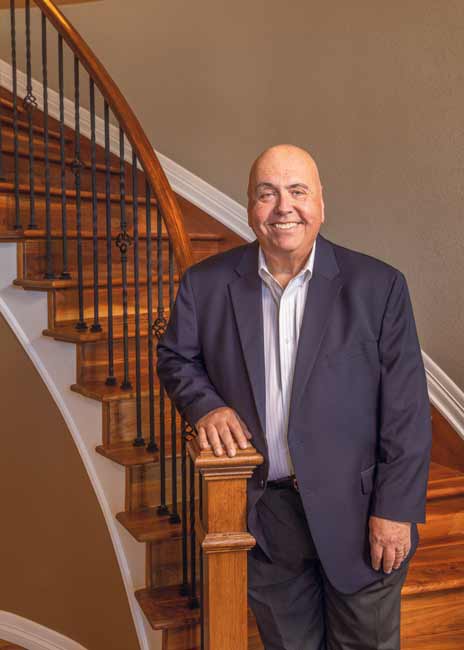 “You’re only as successful as the team you’re working with.”No story about Caruso would be complete without detailing his involvement with FCSI. He is one of the organization’s longest-tenured members, with his 50th anniversary soon approaching. As with most things in his career, he jumped into the organization with both feet, progressing steadily upward through the ranks to higher positions. He served as president of the FCSI Worldwide board of directors in 1984 and 1985 and then again in 2020 and 2021. He is currently serving one more year as past chair for FCSI Worldwide on its board of directors. He also served as chair of FCSI The Americas in 1984 and 1985 as well as in 2018 and 2019.
“You’re only as successful as the team you’re working with.”No story about Caruso would be complete without detailing his involvement with FCSI. He is one of the organization’s longest-tenured members, with his 50th anniversary soon approaching. As with most things in his career, he jumped into the organization with both feet, progressing steadily upward through the ranks to higher positions. He served as president of the FCSI Worldwide board of directors in 1984 and 1985 and then again in 2020 and 2021. He is currently serving one more year as past chair for FCSI Worldwide on its board of directors. He also served as chair of FCSI The Americas in 1984 and 1985 as well as in 2018 and 2019.
In 1986, Caruso received one of his greatest honors from the organization when he was inducted into the FCSI Council of Fellows (FFCSI). “It’s the highest award we offer in FCSI,” says Wade Koehler, executive director of FCSI. “You get it through service to FCSI, service to the industry and service to your local community. It includes time served on boards and committees and everything else within FCSI, but also [service to] local charities, articles written for publications and [service] to the industry as a whole.”
Koehler says that one of Caruso’s most valuable contributions to the organization is the fact that “he truly believed in a global organization, making sure that we expanded beyond the United States. He wanted to make sure that we included the Latin America group, trying to get them more involved.” Caruso used his global FCSI contacts to share projects, says Koehler. “Relying on FCSI people, he made an incredible network of people that he could call up and say, ‘I want to partner with you on this, and here’s where we can both benefit.’”
Koehler has seen firsthand how Caruso’s enthusiasm affects people and draws them to him. “Any time we went around America or even overseas, he always had a table of people around him to talk. Because he’s a good storyteller, a jovial guy to be around, he just attracts people to the industry and to consulting. He thoroughly believes in the consulting industry and has gotten so much out of it personally and professionally. He wants to make sure everybody else gets as much out of it as he did.”



